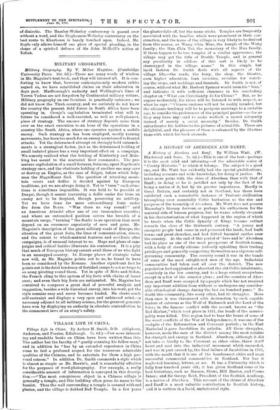MILITARY GEOGRAPHY.
Military Geography. By T. Miller Maguire. (Cambridge University Press. 10s. 6d.)—There are many words of wisdom in Mr. Maguire's text-book, and they will interest all. It is com- forting to know that, however contemptuously modern critics regard us, we have established claims on their admiration in days past. Marlborough's audacity and Wellington's lines of Torres Vedras are not forgotten by Continental military writers. Military geography on our frontiers is practically unknown ; we did not know the Tirah country, and we certainly do not know the country the present field forces in South Africa have been operating in. Cronje's capitulation terminated what will in future be considered a well-executed, as well as well-planned, piece of strategy. The success of strategy depends more than ever on the exact execution to an hour of the operations in a country like South Africa, where one operates against a mobile enemy. Such strategy as has been employed, mostly turning movements, has been too much for an enemy accustomed to frontal attacks. Yet the determined attempt on strongly held entrench- ments is a strategical factor, just as the determined holding of small isolated planes has a very important effect on a campaign. We scarcely realised what the holding of Kimberley and Mafe- king has meant to the scattered Boer commandos. The pre- mature capitulation of a small fortress, Soissons, upset Napoleon's strategy once, and the obstinate holding of another one may save or destroy an Empire, as the case of Sziget, before which Soly- man the Magnificent died. The question of attacking moun- tain crests and defiles is decided against by European traditions, yet we are always doing it. Yet to " turn " such situa- tions is sometimes impossible. It was held to be possible at Dargai, though it meant traversing a defile under fire from an enemy not to be despised, though possessing no artillery. Yet we have done far more extraordinary feats under fire from the Beers. "Was there no way round?" said an American Attache after one of our tremendous assaults ; and where an entrenched position covers the breadth of a mountain range, " turning " the flanks is an operation that must depend on an enormous superiority of men and guns. Mr. Maguire's description of the great military roads of Europe, the situation of the great forts, the lines of communication, rivers, and the extent to whichonatural features and accidents alter campaigns, is of unusual interest to us. Maps and plans of cam- paigns and critical battles illustrate his contention. It is a pity that much of European history cannot avail those of us who fight in an unmapped country. In Europe places of strategic value now will, as Mr. Maguire points out to us, be found to have been so considered by the Romans. Another significant fact he points out is the fatal tendency of fortified camps to act as traps to an army pivoting round them. Yet in spite of Metz and Sedan, the French cling to this system of big forts with chains of lesser ones; and even their big forts are antiquated. Mr. Maguire has contrived to compress a great deal of powerful analysis and suggestion, besides a wide historical survey, into his work, yet the style remains easy and never becomes loaded. He shows much self-restraint and displays a very open and unbiassed mind,—a necessary adjunct to all military science, for the greatest generals have won by displaying an audacity in absolute contradiction to the commonest laws of an army's safety.


















































 Previous page
Previous page